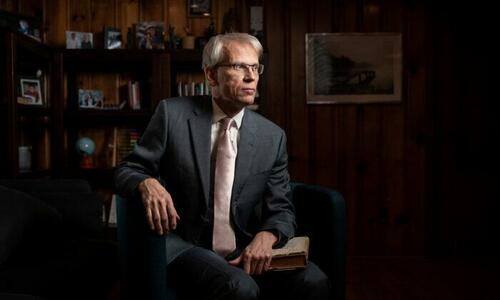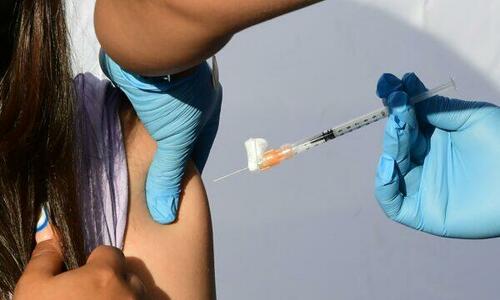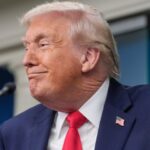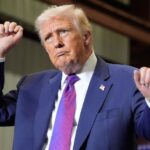
Authored by Mimi Nguyen Ly via The Epoch Times,.
Dr. Martin Kulldorff, a prominent epidemiologist and biostatistician and former Harvard School of Medicine professor, said he was “not surprised” after seeing concrete evidence that a post he shared on Twitter was flagged and prevented from wider dissemination.
Dr. Martin Kulldorff, epidemiologist and statistician. (Samira Bouaou/The Epoch Times)
He expressed disapproval and said that the social media giant’s overall censorship actions have stifled free debate on COVID-19 topics and undermined trust in science.
In the latest installment of the Elon Musk-endorsed “Twitter Files” published early on Dec. 26, journalist David Zweig shared how posts from Kulldorff and several others about COVID-19, including about vaccines, were flagged and censored in various ways by Twitter.
It marked the first trove of direct evidence from the “Twitter Files” showing how Twitter censored scientists, potentially at the behest of the U.S. government, ever since journalist Bari Weiss revealed in early December that Stanford University professor Dr. Jay Bhattacharya had been put on a blacklist due to his views on COVID-19-related lockdowns and school closures.
While Kulldorff said he was not surprised by evidence showing how he and others were censored, he said Twitter should not be the arbiter of which scientists have valid views, and that such censorship shouldn’t happen.
“There should be an open discussion. You can’t expect people to trust public health and trust the scientific community if you don’t have that open communication and open debate,” Kulldorff told The Epoch Times.
In the Twitter post of concern, dated March 26, 2021, Kulldorff said that children and those who had been infected with SARS-CoV-2 do not need to be vaccinated, but that vaccines were important for older high-risk people and their caretakers. The post was flagged by a Twitter moderator as having violated the company’s COVID-19 “misinformation policy.”
An internal email shared by Zweig showed that the moderator claimed Kulldorff had shared “false information regarding the efficacy of the COVID-19 vaccines, which goes against CDC guidelines.” Twitter subsequently labeled the post as “misleading” and turned off all likes and replies.
“But Kulldorff’s statement was an expert’s opinion—one which also happened to be in line with vaccine policies in numerous other countries. Yet it was deemed ‘false information’ by Twitter moderators merely because it differed from CDC guidelines,” Zweig wrote.
“After Twitter took action, Kulldorff’s tweet was slapped with a ‘Misleading’ label and all replies and likes were shut off, throttling the tweet’s ability to be seen and shared by many people, the ostensible core function of the platform.”
A child receives a dose of Pfizer’s COVID-19 vaccine in Los Angeles, Calif., on Nov. 5, 2021. (Frederic J. Brown/AFP via Getty Images)
Kulldorff reiterated his views on COVID-19 vaccination in children, telling The Epoch Times late Monday: “We know and we’ve known ever since the very beginning of the pandemic, and the data from Wuhan, that children are at minuscule risk … from dying from COVID-19.”
“So the benefit of the vaccine, therefore, is almost nothing, because it doesn’t prevent [transmission]. [And] the risk of death and hospitalization [with children] is very low. The benefit is very, very small. We know that,” he added.
“So then the question is, what are the potential harms? And we know there are potential harms, with myocarditis, for example. I think the benefit is so tiny it’s not worth taking the risks of adverse reactions, which we know there is myocarditis, but we don’t know the full extent of adverse reactions yet.”
Kulldorff also dismissed the view that had been promulgated incessantly by health officials and media outlets that COVID-19 vaccination is “safe and effective” at large.
“I think for many people, they only heard one voice. And when they heard alternative voices, [those voices] were sort of dismissed as cranks. But that’s not how medicine or science works,” he said.
“There are many vaccines and many drugs that are important for some people, but unnecessary for others. So to say that everybody should get a vaccine, that’s not very scientific way of thinking about things,” he said.
“Just like saying that nobody should ever be vaccinated is equally unscientific,” he added.
“But we get sort of a polarizing view between the anti-vaxxers and vaccine fanatics,” Kulldorff observed, adding that in his opinion, “the vaccine fanatics have done much more damage to vaccine confidence than anybody else with pushing vaccine mandates based on flawed scientific thinking.”
“I think that [the push for vaccine mandates] has had consequences not only for the COVID-19 vaccine but also for childhood vaccines—important childhood vaccines like polio, for example,” he said.
“So vaccine fanatics who have been pushing for mandates—that everybody should get vaccinated—they have done a lot of damage to vaccine confidence in the U.S. and other parts of the world as well.”
Amid emerging evidence that U.S. government officials have exerted influence on social media companies with regard to the sharing of views on COVID-19, Kulldorff expressed that the government “should not at all be involved” in any such influence.
While various examples have now come to light with regard to Twitter’s censorship of scientists, Kulldorff said he hopes to see the full extent of this censorship one day, such as “a summary of how many were censored, how many were blacklisted, for how long, and so on.”
He said it would also be important to know which person or people were behind the decisions to censor and whether there were people who were reporting posts to Twitter to be censored.
“Were other scientists involved in urging Twitter to censor their fellow scientists who had a different opinion?” he pondered. “And if so, to what extent, and who were those scientists?”
“I have never sent in a report to Twitter, asking them to censor a scientist with a different opinion of mine. I don’t think scientists should engage in such activity.”
Authored by Mimi Nguyen Ly via The Epoch Times,.
Dr. Martin Kulldorff, a prominent epidemiologist and biostatistician and former Harvard School of Medicine professor, said he was “not surprised” after seeing concrete evidence that a post he shared on Twitter was flagged and prevented from wider dissemination.
Dr. Martin Kulldorff, epidemiologist and statistician. (Samira Bouaou/The Epoch Times)
He expressed disapproval and said that the social media giant’s overall censorship actions have stifled free debate on COVID-19 topics and undermined trust in science.
In the latest installment of the Elon Musk-endorsed “Twitter Files” published early on Dec. 26, journalist David Zweig shared how posts from Kulldorff and several others about COVID-19, including about vaccines, were flagged and censored in various ways by Twitter.
It marked the first trove of direct evidence from the “Twitter Files” showing how Twitter censored scientists, potentially at the behest of the U.S. government, ever since journalist Bari Weiss revealed in early December that Stanford University professor Dr. Jay Bhattacharya had been put on a blacklist due to his views on COVID-19-related lockdowns and school closures.
While Kulldorff said he was not surprised by evidence showing how he and others were censored, he said Twitter should not be the arbiter of which scientists have valid views, and that such censorship shouldn’t happen.
“There should be an open discussion. You can’t expect people to trust public health and trust the scientific community if you don’t have that open communication and open debate,” Kulldorff told The Epoch Times.
In the Twitter post of concern, dated March 26, 2021, Kulldorff said that children and those who had been infected with SARS-CoV-2 do not need to be vaccinated, but that vaccines were important for older high-risk people and their caretakers. The post was flagged by a Twitter moderator as having violated the company’s COVID-19 “misinformation policy.”
An internal email shared by Zweig showed that the moderator claimed Kulldorff had shared “false information regarding the efficacy of the COVID-19 vaccines, which goes against CDC guidelines.” Twitter subsequently labeled the post as “misleading” and turned off all likes and replies.
“But Kulldorff’s statement was an expert’s opinion—one which also happened to be in line with vaccine policies in numerous other countries. Yet it was deemed ‘false information’ by Twitter moderators merely because it differed from CDC guidelines,” Zweig wrote.
“After Twitter took action, Kulldorff’s tweet was slapped with a ‘Misleading’ label and all replies and likes were shut off, throttling the tweet’s ability to be seen and shared by many people, the ostensible core function of the platform.”
A child receives a dose of Pfizer’s COVID-19 vaccine in Los Angeles, Calif., on Nov. 5, 2021. (Frederic J. Brown/AFP via Getty Images)
Kulldorff reiterated his views on COVID-19 vaccination in children, telling The Epoch Times late Monday: “We know and we’ve known ever since the very beginning of the pandemic, and the data from Wuhan, that children are at minuscule risk … from dying from COVID-19.”
“So the benefit of the vaccine, therefore, is almost nothing, because it doesn’t prevent [transmission]. [And] the risk of death and hospitalization [with children] is very low. The benefit is very, very small. We know that,” he added.
“So then the question is, what are the potential harms? And we know there are potential harms, with myocarditis, for example. I think the benefit is so tiny it’s not worth taking the risks of adverse reactions, which we know there is myocarditis, but we don’t know the full extent of adverse reactions yet.”
Kulldorff also dismissed the view that had been promulgated incessantly by health officials and media outlets that COVID-19 vaccination is “safe and effective” at large.
“I think for many people, they only heard one voice. And when they heard alternative voices, [those voices] were sort of dismissed as cranks. But that’s not how medicine or science works,” he said.
“There are many vaccines and many drugs that are important for some people, but unnecessary for others. So to say that everybody should get a vaccine, that’s not very scientific way of thinking about things,” he said.
“Just like saying that nobody should ever be vaccinated is equally unscientific,” he added.
“But we get sort of a polarizing view between the anti-vaxxers and vaccine fanatics,” Kulldorff observed, adding that in his opinion, “the vaccine fanatics have done much more damage to vaccine confidence than anybody else with pushing vaccine mandates based on flawed scientific thinking.”
“I think that [the push for vaccine mandates] has had consequences not only for the COVID-19 vaccine but also for childhood vaccines—important childhood vaccines like polio, for example,” he said.
“So vaccine fanatics who have been pushing for mandates—that everybody should get vaccinated—they have done a lot of damage to vaccine confidence in the U.S. and other parts of the world as well.”
Amid emerging evidence that U.S. government officials have exerted influence on social media companies with regard to the sharing of views on COVID-19, Kulldorff expressed that the government “should not at all be involved” in any such influence.
While various examples have now come to light with regard to Twitter’s censorship of scientists, Kulldorff said he hopes to see the full extent of this censorship one day, such as “a summary of how many were censored, how many were blacklisted, for how long, and so on.”
He said it would also be important to know which person or people were behind the decisions to censor and whether there were people who were reporting posts to Twitter to be censored.
“Were other scientists involved in urging Twitter to censor their fellow scientists who had a different opinion?” he pondered. “And if so, to what extent, and who were those scientists?”
“I have never sent in a report to Twitter, asking them to censor a scientist with a different opinion of mine. I don’t think scientists should engage in such activity.”
Loading…








